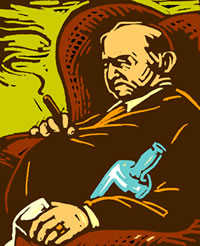
26th Sunday in Ordinary Time Year C
Luke returns to the teaching of Jesus concerning poverty and wealth. In today’s gospel reading, however, we are taken to a new level of understanding, as the issue is related to the very heart of the Good News brought by the Saviour. With the parable of Lazarus at the rich man’s gate, Jesus shows his skills as a storyteller, able to enthral his listeners, as he challenges their complacency.
This story, we are told, is addressed ‘to the Pharisees’, many of whom were attached to their wealth, seeing it as a sign of God’s favour. The rich man in the story is not condemned for evil behaviour. Reading between the lines, we may well conclude that he thought he had treated Lazarus well – he had allowed him to remain at the gate in his destitution; and he was happy for him to have the leftovers of his feasting. The Pharisees are told, however, that when he repeatedly addressed Abraham as his ‘father’ he was rejected. On the other hand, Lazarus – whose name means ‘God helps’ – is received by Abraham as the guest of honour - at the eschatological banquet looked forward to by the prophets (‘in the bosom of Abraham’ indicates his reclining at table next to Abraham). The rich man, and those like him, are not accepted as true children of Abraham, because, in their complacent insensitivity, they have disregarded the teaching of the Law of Moses and the exhortations of God’s prophets – a teaching that Jesus makes his own.
Lazarus represents ‘the poor’, whose cry the Lord hears – the common people looked down upon by the Pharisees, people whose straitened circumstances made it next to impossible for them to carry out the many prescriptions seen by this well-to-do group as a true observance of the covenant. Because the power structures of their people left these ‘anawim’ disenfranchised, they must stand before God in a trust and hope that kept alive the genuine faith traditions of Israel’s covenant with their God. Jesus himself comes from their midst; and his great mission will carry forward the ways of his Father, the God of the covenant – revealed from the first as the champion of the poor and oppressed. Those who follow him are from this background; and the communities they form will share their outlook (cf. 1 Cor 1:26-27: ‘Consider, brothers, how you were called … not many influential …God chose those who are weak to shame the strong’). Jesus appeals, in his parable, to the prophets, so often defenders of the powerless and mouthpieces of their faith – as in the stinging rebuke of Amos in today’s reading. It was the prophets who condemned the empty ritualism that was an escape from what the covenant really required – ‘Is this not the fast that pleases me … sharing your food with the hungry and sheltering the homeless poor’ (Is 58:6-7).
The lesson of the parable, of course, extends far beyond the need for material assistance. Our neighbours have also emotional and spiritual needs, to which true followers of Jesus will respond in friendship and concern.
John Thornhill sm

